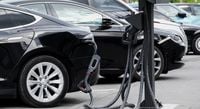In April 2025, Ukraine witnessed a significant surge in the adoption of electric vehicles, with the country's car fleet increasing by 5,792 units powered by battery sources. According to the Ukrainian automotive industry association, UkrAvtoProm, this marks a remarkable 37% increase in demand compared to the same month last year.
The majority of the newly registered electric vehicles were passenger cars, totaling 5,623 units. Among these, 922 were new vehicles, reflecting a 30% rise in new electric car registrations, while 4,701 were used cars, which saw a staggering 37% increase in sales. This trend highlights a growing acceptance and preference for electric mobility among Ukrainian consumers.
Interestingly, only a small fraction of the commercial electric vehicles sold were new, with just 9 out of 169 commercial electric vehicles being newly registered. This contrasts sharply with April 2024, when 4 out of 79 commercial electric vehicles were new. This indicates that while personal electric vehicle sales are booming, the commercial sector is lagging behind in new registrations.
Among the new electric vehicles, the BYD Song Plus emerged as the top choice for buyers, with 179 units sold. Following closely were the VW ID.Unyx with 153 units, the Audi Q4 with 75 units, the Zeekr 001 with 63 units, and the Zeekr 7X with 43 units. This diverse lineup of popular electric vehicles showcases the growing variety of options available to consumers.
In terms of used electric vehicles, the Tesla Model Y led the pack with 552 units sold. The Nissan Leaf followed with 544 units, while the Tesla Model 3 came in third with 478 units. Other popular choices included the KIA Niro with 350 units and the Hyundai Kona with 296 units. This data underscores the strong demand for established electric vehicle models in the used car market.
The increase in electric vehicle sales is not just a one-off trend. In March 2025, the Ukrainian car fleet also saw an increase of 4,680 electric vehicles, marking a 6% rise compared to the previous year and a 4% increase from February 2025. This consistent growth indicates a robust and sustained interest in electric vehicles among Ukrainian consumers.
Regionally, the largest markets for electric vehicle sales in Ukraine were Kyiv and the surrounding areas, including Kyiv region, Dnipropetrovsk region, Odesa region, and Lviv region. In most regions, the BYD Song Plus EV was the leading choice among new electric vehicles, except in Dnipropetrovsk, where the Volkswagen ID.Unyx took the top spot.
When it comes to used electric vehicles, preferences varied by region. In Lviv and Kyiv, consumers favored the Tesla Model Y, while the Kyiv region and Dnipropetrovsk region showed a preference for the Tesla Model 3. In Odesa, the Nissan Leaf was the most registered used electric vehicle.
This surge in electric vehicle sales reflects a broader global trend towards sustainable transportation solutions. As countries around the world grapple with climate change and air pollution, electric vehicles are increasingly seen as a viable alternative to traditional gasoline-powered cars.
In a related note, the global automotive market continues to evolve, with the Toyota Corolla emerging as the most popular model worldwide in the first quarter of 2025, selling over 240,000 units. The Toyota RAV4 and Ford F-Series also ranked among the top three best-selling vehicles globally. In Europe, the Renault Clio took the lead as the most popular model during the same period, with over 72,000 units sold.
The rise in electric vehicle sales in Ukraine is a promising sign for the country's automotive industry. As more consumers embrace electric mobility, the demand for charging infrastructure and government incentives will likely increase, paving the way for a greener future.
Overall, the data from April 2025 is indicative of a significant shift in consumer behavior towards electric vehicles, driven by a combination of environmental awareness, technological advancements, and changing market dynamics. As the trend continues, it will be essential for stakeholders in the automotive industry to adapt to the evolving landscape and support the transition towards sustainable transportation.

